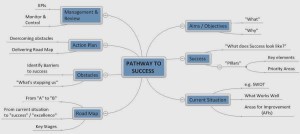One of the biggest struggles I hear from people about promoting their blog content and driving traffic to their websites is that they don’t know how to get the content out to people beyond their existing email list or audience.
Sure we can email our list, share to our Facebook page and Twitter followers. We can Pin it and post it to Instagram. But if people aren’t already following us in one of those places, how will they find it?
What comes next?
As I’ve been talking about for the past few posts, influencer or relationship marketing is an excellent way to build relationships with other business owners in your niche with the end goal of borrowing their audience and sharing your message.
Once you understand what influencer marketing is and have a good idea how to go about building the relationships, it’s time to get started and actually #dothedamnwork to start building those relationships.
And one easy and effective way to start is by leaving comments.
Aren’t comments totally over?
Say whaaat? you may be thinking. I thought comments on blogs were dead.
Well, yes and no.
It’s true that with the rise of social media, we’ve seen commenting on blog posts plummet. Even the bigwigs are seeing far fewer blog comments than they used to. And some major sites and media outlets have disabled commenting altogether.
But that doesn’t mean commenting is dead.
In fact, when Quicksprout’s Neil Patel did an experiment around commenting, he generated leads that led to $ 25,000 in revenue for him.
So no, commenting is not dead. But it has changed a bit.
Back in the dear dead days, many people left comments on other blogs with the express intent of generating backlinks to their website. Google uses who links to you as a measure of how important you are — so if someone famous links to you, you get a bump in your SEO. People tried to game the system by using the comments as a way to link back to their site.
Nowadays, most sites us a “nofollow” linking system within their comments, meaning you won’t get any Google juice from commenting, so if you’re just doing it to try to improve your ranking, fuggetaboutit.
If, however, you’re looking to do it to build a relationship with the site author and possibly generate some traffic from their audience to your site, it can be a good addition to your promotion strategy.
Here’s what to do:
1. Be thoughtful, deliberate, and useful.
First, actually read the dang blog post. As I mentioned in my last post, this kind of marketing is relationship marketing, in essence, and it’s a long game. You can’t just comment, “Thanks!” or “Great post!” and expect it to drive clicks. That means you have to actually read the post and/or the other comments and have an actual coherent thought to share related to what’s being discussed.
Then, take the time to compose a thoughtful comment. It doesn’t have to be long, but at least four sentences long seems to be a good sweet spot. Aim to actually contribute to the conversation. My gut tells me that the comments that will drive the most clicks will be helpful and position you as an expert in your subject.
2. Choose your blogs wisely.
Not all blogs are going to produce the same results when it comes to commenting for clicks. General topic, mainstream blogs like the Huffington Post aren’t going to drive the same sort of traffic as niche blogs for two reasons: First, your comment is likely to get lost in a SEA of comments on a big site like HuffPo, and second, their readers are interested in many different topics instead of being focused on your topic.
Instead, focus on finding blogs that reach your ideal audience — that aren’t direct competitors. You can use the think sideways method to generate ideas about where to look for these sorts of sites.
Create a list of blogs that match your criteria and then figure out when new posts are added, and try to visit and comment as soon as the posts are published. This is especially important if you are commenting on a site that gets lots of comments; more people will see your comment the higher up on the list you are.
Another great technique is to respond to comments on guest posts you do. If you guest for someone else or are a guest on a podcast or similar, it is well worth your time to respond to comments on those posts. It shows you’re engaged and gives the original commenter an additional reason to click on your site and check you out.
3. Track your progress.
Just as with any promotional strategy, it’s important to be able to track your success with a new technique. The easiest way to do this with commenting is to use a link-shortening service like Bit.ly to create a unique URL you can put in the URL field for the comment.
You can create one link to use for all the comments you leave, or generate a unique link for every post you comment on. Either way, you can track how many clicks you get from that link and determine how much traffic you’re generating.
This can yield loads of insights, including which blogs are most worth your time for commenting.
Now that you know what you should do, here are a few things Not to do:
- DON’T spam blogs by just going through and commenting on every post indiscriminately. Remember step one; focus on building a relationship building by being useful and relevant.
- DON’T necessarily link to your website in the body of the comment. Unless you’re being genuinely useful and pointing people to a resource on your website, you probably don’t want to link directly to the site. Use the URL field in the comment form instead.
- DON’T pick fights or be a troll. Remember, you’re trying to get people to LIKE you. Be a good human.
- DON’T comment on your direct competitors. It’s just a little icky. Look for people who reach your audience, but aren’t directly competing with you.
- DON’T be salesy. I probably wouldn’t even mention that you have a product. Be useful instead.
If you want to learn more about building commenting for clicks into your promotional strategy system (you have a promotional strategy system… right?) and how to figure out where you should be contributing to the conversation, I highly recommend joining the Content Promotion Workshop Beth Hayden and I are doing.
Digital & Social Articles on Business 2 Community(35)
Report Post






